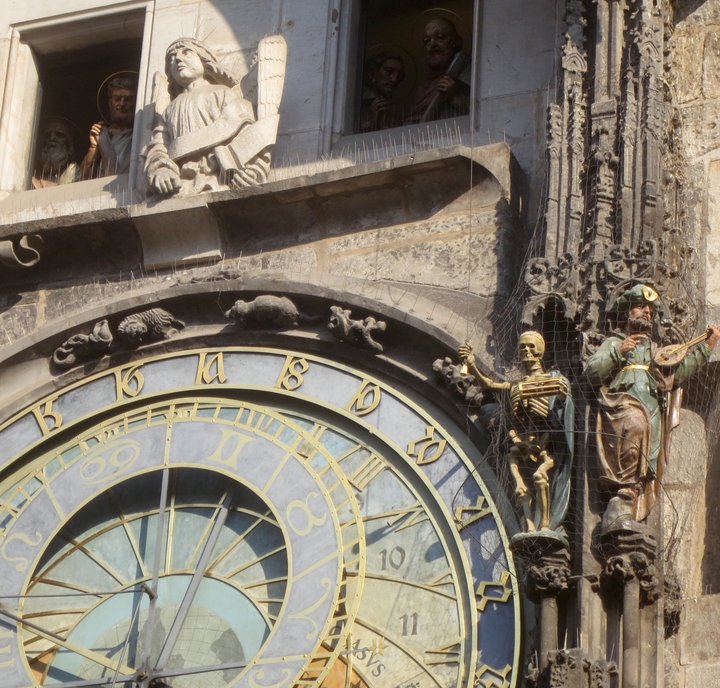You
don’t understand, Jill. People like that have something inside…
something to do with death.
— Cheyenne/Jason Robards, Once Upon a Time in the West)

Your hours are numbered! Death tolls the hour, every hour, on Prague’s “orloj,” or astronomical clock. (Barry Evans).
I’ve long been of the opinion that the only thing worse than dying is not dying. Death is what gives life meaning: no death, what’s the point? If we’re immortal, we can just slouch off any urgency to actually do anything, there’s all the time in the world.
For Christmas, I received a set of New York Review Books graphic novels, the first of which was a reprint of Italian novelist Dino Buzzati’s Poem Strip including An Explanation of the Afterlife, written and illustrated in the 1960s. This caught my eye, the troubadour Orfi singing to those living — forever — in Hell: “Do you remember friends? The ultimate bliss [of making love], but never joyful, never, for it would be nothing without the knowledge deep down that one day all this would end.” Exactly. Finiteness = edginess. Old age should burn and rave — actually, any age.
I don’t spend a lot of time thinking about death. Not that I choose what to think about (or even whether to think). But whatever unconscious processes decide for “me” find other and (I hope) more immediate distractions for joy or anxiety. Consciously, though, I’m motivated by a comment from anti-guru UG Krishnamurti (emphatically no relation to the better-known Jiddu Krishnamurti). When asked about death (“What happens when we die? Is there life after death?”) by an earnest young American who had traveled to Bangalore to visit with him, UG replied — testily as usual — that if the guy was going to be worrying about death at his age, he might as well be dead already.
(The
story about the Zen master, related in Lawrence Shainberg’s
Ambivalent Zen, who was asked what happens when we die. The
master says, “I don’t know.” The student responds, “But
you’re a Zen master!” “Yes,” he says, “but not a dead
one.”)
Me,
intellectually at least, I can’t get too exercised about the
prospect of actually being dead — I won’t be around to care, duh.
Dying, yeah — cancer, Alzheimer’s, stroke, the usual litanies of
what gets us because, dammit, we just live too long in this
enlightened era — those I can do without. But death itself, no
biggie. To be born is to receive a death sentence, so “Let us crown
ourselves with roses while we may,” per the Wisdom of Solomon.
Whatever. Lately death has, as it were, been a-stalking. A dear friend suffering the pain of terminal cancer is starting to work with hospice services. Another recently left the planet: liver disease. And J, our dear pal who choked to death in a restaurant restroom — we believe her southern upbringing wouldn’t allow her to make a public scene when a lump of chicken stuck in her throat. And so on. Age brings its share of losing those around us. My mum said the very worse thing about getting old was loneliness as her peers preceded her into that good night.
As a species, we’ve been philosophizing about death ever since we learned to write. A 4,000-year-old clay tablet from Babylon reads, “As for mankind, numbered are their days/Whatever they achieve is but wind.” The Bhagavad-Gita reminds us, “For certain is death for the born and certain is birth for the dead; therefore over the inevitable thou should not grieve.” Just to put the nail in the coffin, so to speak, here’s novelist John Fowles: “Each pleasure we feel is a pleasure less; each day a stroke on a calendar. What we will not accept is that the joy in the day and the passing of the day are inseparable.”
Do we all die with regrets? How can we know until it’s right there in front of us? Will our dying words be like those of John Maynard Keynes: “I wish I’d drunk more champagne”? Or like Audrey II in Little Shop of Horrors, who summed it all up in two words: “Oh shit!”
CLICK TO MANAGE